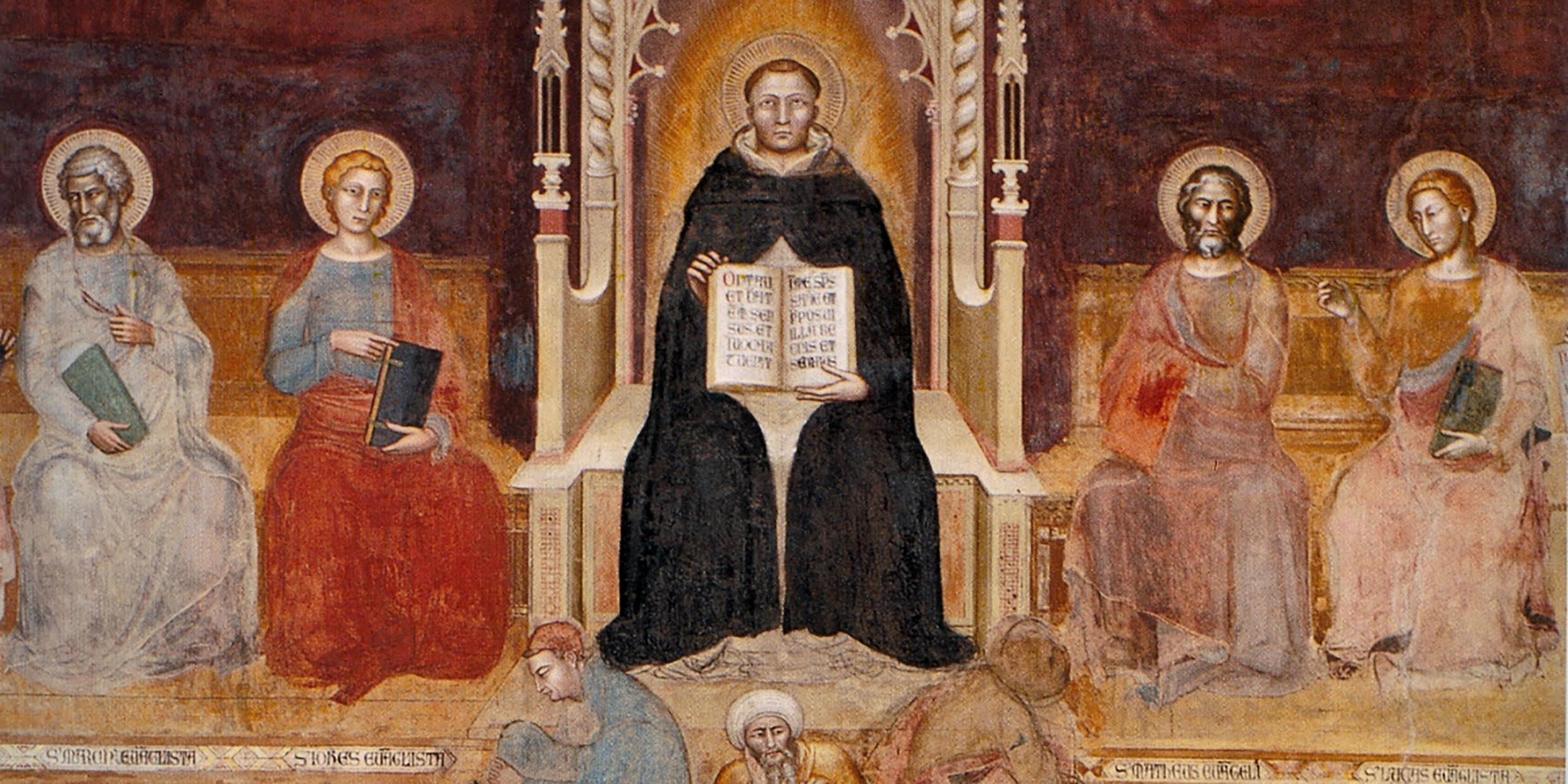Originally published 4 June 2006
A half-century ago, when I was an undergraduate at the University of Notre Dame, Thomas Aquinas ruled the roost. If you were a student at a Catholic college or university anywhere in the world in those days you were probably required to take a course or two of Thomistic theology. The Angelic Doctor’s massive, multi-volume Summa Theologica stood as the rock-solid foundation of Catholic education.
Aquinas’s method is to state a thesis, raise objections, then refute the objections. My problem was, as an undergraduate, that I usually found the objections more cogent than the thesis or refutations.
The Summa is clearly a monumental achievement of the human mind, and I am glad to have been exposed to it, as I was exposed to Aquinas’ 13th-century contemporary Dante Alighieri. But although I return often to Dante, I left Aquinas behind. I fail to see what relevance a natural theology based on an Aristotelian or medieval world view has to our own times.
Reading Thomas Aquinas for natural theology is like reading his contemporary Johannes de Sacrobosco for astronomy: interesting as history, but not terribly relevant to contemporary thought.
I recall a time when I was a young graduate student in physics at UCLA and attended a talk at the Newman House (the Catholic chaplaincy) on the morality of artificial contraception. My wife and I had started a family, and could have used something besides “rhythm” to help us achieve the family we wanted. But alas there was something called “the natural law,” so forcefully articulated by Aquinas, that put contraception out of the reach of “good” Catholics. I struggled to understand what this “natural law” stuff had to do with the laws of nature I was learning in my science classes. It seemed perfectly natural to me that a young married couple in the mid-20th century might not want a child every year ad infinitum, and that human intellect was a gift not to be wasted.
When I began teaching at Stonehill College, students of philosophy used as a text Thomistic philosopher Vincent Edward Smith’s The General Science of Nature (bearing, of course, the Nihil Obstat and Imprimatur designating doctrinal purity), which had about as much to do with modern science as did Sacrobosco’s astronomy — and an impenetrable prose style to boot. How much more exhilarating it must be for young Catholics today to go to the philosophy of science section of the library and find books by Thomas Kuhn, Richard Dawkins, Gerald Holton, John Ziman, Lewis Wolpert, Steve Fuller, and many others who know contemporary science from the inside and who appreciate why we now live in a universe of galaxies and DNA rather than a universe of angels and demons. The writers available to our present students would be appalled to have anyone’s imprimatur of doctrinal purity.
So I leave Thomas Aquinas where I found him those many years ago on the sagging shelves. But also in those early days I read the great spiritual writers of Christian Europe: Meister Eckhart, Julian of Norwich, the author of The Cloud of Unknowing, John of the Cross, and others. Their celebratory spirit has stayed with me, and transcends any particular theological formulation (even Buddhists feel at home among the Christian mystics). Eckhart, for example — a contemporary of Aquinas and fellow Dominican — considered every plant, every stone a revelation of the divine. He was not quite a pantheist, but neither was he an orthodox theist (he was condemned as a pantheist by the official Church); that is, he did not identify God with the visible world, but neither did he imagine a God who exists outside of creation. Eckhart’s God and the creation are inseparable: all things in God, God in all things. This may be the stuff of Inquisitional nitpicking, but it represents a tradition of joyful creation spirituality that rests more conformably with modern science than do Aquinas’s volumes of verbal boilerplate. No less a philosopher than Hegel thought Eckhart a reconciler of science and faith. The contemporary spiritual writer Matthew Fox, himself an ex-Dominican, says of Eckhart; “[He] is an Aquinas with imagination, an Aquinas freed of too tightly woven Scholastic language, an Aquinas in poetry.”
Of course, the Thomists shoulder on, although they have lost their commanding position in Catholic education, still hoping to find more wisdom on the sagging library shelves than in the creation itself. The Times Literary Supplement recently reviewed a book by the Thomistic philosopher Jean Porter on the foundations of ethics in natural law. The review is quite favorable, but I confess to being as baffled by Thomistic discourse today as I was half-a-century ago. I quote from the review: “Where nature is understood ‘more as nature,’ we have in view the way in which, as Porter puts it, ‘every creature manifests certain orderly patterns of action, simply as such — to be, to maintain its existence — and in addition, every living creature manifests further, more complex patterns, for example, orderly growth and reproduction.’ These ‘intelligible structures of natural processes’ provide the basis for the ‘properly rational activities of the human creature…”, and so on. Whatever this means is beyond the ken of my poor rational faculties.



